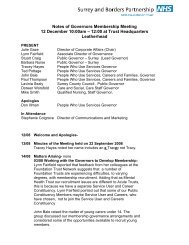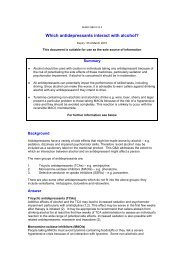Here - Surrey and Borders Partnership NHS Foundation Trust
Here - Surrey and Borders Partnership NHS Foundation Trust
Here - Surrey and Borders Partnership NHS Foundation Trust
Create successful ePaper yourself
Turn your PDF publications into a flip-book with our unique Google optimized e-Paper software.
We are not so aware of the hidden forces<br />
at work generated by the social<br />
expectations of being asked about our<br />
plans in front of another, which push us<br />
into making a prediction at variance with<br />
what we would really do in the privacy of<br />
our own un-observed lives.<br />
Having made the prediction, we then<br />
work to fall into line with it.<br />
Another, related, theory is that this is an<br />
example of the power of expectation.<br />
Psychologists have demonstrated for<br />
almost half a century now, that if<br />
teachers are manipulated into expecting<br />
their pupils to be intelligent or stupid,<br />
they then work to render these<br />
expectations self-fulfilling prophecies.<br />
Judges give directions to juries at the<br />
beginnings of trials that appear to bias<br />
the outcome in line with the bench’s<br />
expectation of the future. We also<br />
directly seem to suffer for this effect – if<br />
our expectation of ourselves is<br />
manipulated experimentally, we then<br />
provide later behavioural confirmation of<br />
our expectations of ourselves.<br />
More on Expectations<br />
One of the most famous experiments in<br />
Social Psychology which demonstrated<br />
the power of expectation is a 1977 study<br />
by a team lead by Mark Snyder, now at<br />
the University of Minnesota, in which men<br />
were shown photographs of a woman to<br />
whom they would be talking by phone.<br />
The woman in the pictures was<br />
r<strong>and</strong>omised to being either extremely<br />
physically attractive or unattractive (as<br />
rated by other independent observers).<br />
What the men taking part in the<br />
experiment didn’t know, was that those<br />
sneaky psychologists had told a porky pie,<br />
<strong>and</strong> the photographs were not only<br />
r<strong>and</strong>omly assigned to the men, but they<br />
also did not correspond in any way to the<br />
actual woman with whom they had the<br />
phone conversation.<br />
While it would come as no surprise that<br />
the men behaved differently to the<br />
women during the phone conversation<br />
depending on their (manipulated) beliefs<br />
on her physical appearance, the really<br />
surprising finding was that independent<br />
ratings of the women's segments of the<br />
conversations revealed that females<br />
whose conversational partners believed<br />
them to be less appealing, actually<br />
behaved <strong>and</strong> sounded less attractively (eg<br />
they were rated as sounding less warm<br />
<strong>and</strong> interesting).<br />
The women, just as the men, had also<br />
been kept completely in the dark by the<br />
psychologists about the photograph<br />
manipulation. They were not aware it had<br />
taken place. This effect, therefore, had to<br />
have been mediated in some way through<br />
the men's behavior. One possibility, is that<br />
the men who were talking to someone<br />
they believed to be unattractive, were<br />
themselves less affable than men who<br />
believed they were talking to an attractive<br />
woman. This in turn had an impact on the<br />
way the women responded, <strong>and</strong> then<br />
they way they came over to an<br />
independent observer.<br />
The ‘Pygmalion Effect’ is a special instance<br />
of the self-fulfilling prophecy; where<br />
having an expectation of another, itself<br />
causes that target to modify their<br />
performance so it falls into line with the<br />
expectation of the first party.<br />
Just in case you are starting to think that<br />
Self-Fulfilling Prophecies only inhabit the<br />
obscure world of experimental<br />
Psychology, remember we are living<br />
through a banking crisis <strong>and</strong> suffering its<br />
long term impact, <strong>and</strong> banking crises are<br />
a form of self-fulfilling prophecy.<br />
Because a rumour starts that a bank may<br />
fail, this precipitates a run on that bank,<br />
which in itself inevitably leads to its<br />
collapse. This is why Chancellors of the<br />
Exchequer hot foot it to the nearest TV<br />
studio to ‘steady the markets’ at the<br />
slightest hint of such runs on major<br />
financial institutions. Governments, <strong>and</strong><br />
the whole financial system, live in terror<br />
of the power of the self-fulfilling<br />
prophecy.<br />
It’s so powerful <strong>and</strong> reliable that you can<br />
literally ‘bank’ on it.<br />
Editorial<br />
<strong>Surrey</strong> <strong>and</strong> <strong>Borders</strong> Online Journal www.sabp.nhs.uk/journal 5
















